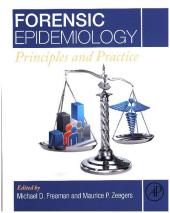 Neuerscheinungen 2016Stand: 2020-02-01 |
Schnellsuche
ISBN/Stichwort/Autor
|
Herderstraße 10
10625 Berlin
Tel.: 030 315 714 16
Fax 030 315 714 14
info@buchspektrum.de |

Michael Freeman, Maurice Zeegers
(Beteiligte)
Forensic Epidemiology
Principles and Practice
Herausgegeben von Freeman, Michael; Zeegers, Maurice
2016. 434 S. 235 mm
Verlag/Jahr: ACADEMIC PRESS 2016
ISBN: 0-12-404584-7 (0124045847)
Neue ISBN: 978-0-12-404584-2 (9780124045842)
Preis und Lieferzeit: Bitte klicken
It is an inescapable fact that causation, both generally (in populations), and specifically (in individuals), cannot be observed. Rather, causation is determined when it can be inferred that the risk of an observed injury or disease from a plausible cause is greater than the risk from other plausible causes. While many causal evaluations performed in forensic medicine are simplified by the fact that the circumstances surrounding the onset of an injury or disease clearly rules out competing causes (eg, a death following a fall), there are many cases that present a more complicated picture. It is these types of investigations, in which an analysis of comparative levels of risk from competing causes is needed to arrive at a reliable and accurate determination of the most likely cause, that forensic epidemiology (FE) is directed at.
In Forensic Epidemiology , the authors present the legal and scientific theories underlying the methods by which risk is used in the investigation of individual causation. Methods and principles from epidemiology are combined with those from a multitude of other disciplines, including general medicine, pharmacology, forensic pathology, biostatistics, and biomechanics, inter alia, as a basis for investigating the plausibility of injury and disease exposures and mechanisms. The ultimate determination of the probability of causation (PC) results from an assessment of the strength of association of the investigated relationship in the individual, based on a comparison between the risk of disease or injury from the investigated exposure versus the risk of the same disease or injury occurring at the same point in time in the individual, but absent the exposure. The principles and methods described in Forensic Epidemiology will be of interest to those who work and study in the fields of forensic medicine, epidemiology, and the law.
Historical perspective on how epidemiologic evidence of causation has been used in courts in the US and Europe
Theory and science underlying the use of risk to assess individual causation
Primer on epidemiologic methods, and various measures used to arrive at individualized comparative risk assessments and PC
The use of statistical methods applied to publicly available data for ad hoc analysis of PC applicable to the specific circumstances of a case
Background on complementary disciplines, including forensic pathology, death investigation, biomechanics, and survival analysis
Examples of applied FE in the investigation of traffic injury and death, automotive and other product defect litigation, medical negligence, and criminal prosecution and defense
1. History of Epidemiology in the courts
2. History of FE
3. Basic tenets of Epidemiology
4. Different types of epidemiologic studies used in FE
5. Test accuracy
6. Statistical tests used in Epidemiology
7. Probability and the Law
8. Common logical fallacies encountered in FE
9. Causation
10. Sources of data for FE investigation
Adjunctive disciplines utilized in FE investigations
11. Medicine
12. Toxicology
13. Pharmacology
14. Biomechanics
15. Principles of death investigation
Applied Forensic Epidemiology
16. Governmental uses of epidemiologic investigation
17. FE in criminal cases
18. FE in civil cases
19. Toxic tort investigation
20. Product defect investigation
21. Injury litigation
22. Medical negligence
23. Life expectancy projections
Zeegers, Maurice P.
Dr. Maurice Zeegers has dedicated his career to researching bladder cancer, during which he has directed numerous research studies and randomized clinical trials to investigate the relationship between nutrition and urinary bladder carcinogenesis. He has published over 250 peer-reviewed scientific papers in the highest-ranked academic journals and is regularly invited to speak on the topic at international scientific conferences. Dr. Zeegers currently holds a Chair in Complex Genetics and Epidemiology as full professor at Maastricht University in the Netherlands, where he also serves as its Head of School and as Director of CAPHRI, the Care and Public Health Research Institute. He acts as the vice-president of the European Epidemiology Federation and holds honorary professorships in England, Belgium and China.


